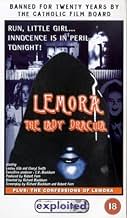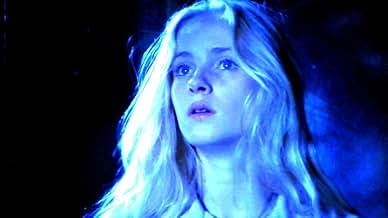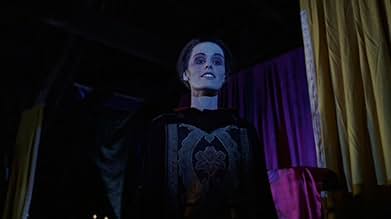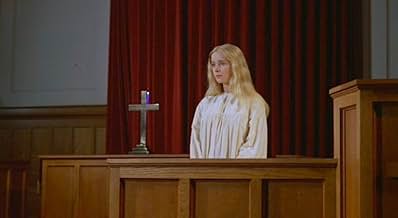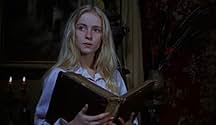Lemora - Kampf mit der Unterwelt
Originaltitel: Lemora: A Child's Tale of the Supernatural
IMDb-BEWERTUNG
6,1/10
2702
IHRE BEWERTUNG
Füge eine Handlung in deiner Sprache hinzuA young girl who returns to her hometown to see her dying father finds herself being drawn into a web of vampirism and witchcraft.A young girl who returns to her hometown to see her dying father finds herself being drawn into a web of vampirism and witchcraft.A young girl who returns to her hometown to see her dying father finds herself being drawn into a web of vampirism and witchcraft.
- Regie
- Drehbuch
- Hauptbesetzung
Empfohlene Bewertungen
Never had heard of this one before, and I assumed it would just be a low-budget snoozer - but it's not! It's pretty damn good! Angelic girl leaves her church to find her murderous dad so she can forgive him and finds herself involved with vampires instead. Very well shot and quite creepy. This deserves more attention. Plenty of tension; it feels like there's something supernatural and terrifying around every corner. Cheryl Smith made her debut here - she would later adopt the professional nickname Rainbeaux and briefly play with the Runaways band.
Scary repeated showings on Thing Theater in Chicago during the 70's did their damage to me. Vampirism, lesbianism, witchcraft all done in that plodding, atmospheric 70's way. Eerie.
Looking at the packaging to this lost classic, I was expecting a real crummy slice of early 70's schlock, hence why I took so long to actually put the tape into the VCR, so it was a total surprise when it turned out to be a genuinely very haunting, beautifully made creepfest.
The plot's fairly simple, for anyone who hasn't seen it, involving as it does a pure-as-the-driven snow church girl, Lila Lee, (of an unspecified age but I'm guessing around 13/14?) who receives a letter from the mysterious "Lemora" asking her to come out to some remote town in the middle of nowhere to see her long-lost gangster Father as he lies on his deathbed. Needless to say, Lemora is not all she appears to be and the mysteries surrounding her ominous precense unfold slowly but with a powerfully creepy vibe throughout the film's running time.
I was really taken aback by the care which appeared to go into making the film - the soundtrack, both musically and (more to the point) the sound effects themselves, were magnificently done with lots of 'night time' sounds quite high in the mix and some really appropriately done 'scare' noises, such as a scene in which Lila is attacked by a ghoul after taking a bath, which is punctuated by an intense high-pitched shrieking noise getting progressively higher in pitch as the scene goes on... it's maybe not the smartest trick in the book but it makes the scene a *LOT* more effective and it's little touches like this which made the movie. Same goes for the imagery, which is often very surreal and frightening. Much of the film is shot in the dark and usually if something comes out of the shadows, it's something horrible that you don't want to see! There are some beautifully done shots though, such as the one in which Lila discovers Lemora's vampirism by watching her through the window as she bites a young child - the way the shot is set up, I thought was very nicely done indeed... It may not be Mario Bava but then, if it was, it'd probably not be anywhere near as affecting - there's something about the subtlety of the film which gives it a low-key, moody edge.
There's very little gore, no real nudity and nothing that smacks of the exploitation clichés the packaging suggests. The much-touted 'lesbianism' angle on the back of the box is played as merely a quiet subtext, adding yet another pleasingly understated edge to the movie.
I dunno *just* how obscure this movie is, but it definitely doesn't deserve to be. I was very very impressed - it's a dark fairytale in the same vein as some of Jean Rollin's stuff but with a much more coherent narrative, none of the more explicit 'erotic' elements and a strange innocence to it which makes it all the creepier... Most of the film is seen through a child's eyes and many of the scares play on childhood fears, or at least things that would've creeped *me* out tremendously as a child and still lurk around at the back of 'ye olde braine'... There's little moments, like when Lila wakes up in 'the stone room' and looks through the bars to see laughing, dancing shadows behind the curtains in the mansion window nearby... urrgh, difficult to even explain why, but things like this *REALLY* give me the shivers. That probably sounds crass and silly the way I've written it, but trust me on this one, "Lemora" is one seriously unnerving little gem of a film and a must for anyone into horror cinema IMHO.
The plot's fairly simple, for anyone who hasn't seen it, involving as it does a pure-as-the-driven snow church girl, Lila Lee, (of an unspecified age but I'm guessing around 13/14?) who receives a letter from the mysterious "Lemora" asking her to come out to some remote town in the middle of nowhere to see her long-lost gangster Father as he lies on his deathbed. Needless to say, Lemora is not all she appears to be and the mysteries surrounding her ominous precense unfold slowly but with a powerfully creepy vibe throughout the film's running time.
I was really taken aback by the care which appeared to go into making the film - the soundtrack, both musically and (more to the point) the sound effects themselves, were magnificently done with lots of 'night time' sounds quite high in the mix and some really appropriately done 'scare' noises, such as a scene in which Lila is attacked by a ghoul after taking a bath, which is punctuated by an intense high-pitched shrieking noise getting progressively higher in pitch as the scene goes on... it's maybe not the smartest trick in the book but it makes the scene a *LOT* more effective and it's little touches like this which made the movie. Same goes for the imagery, which is often very surreal and frightening. Much of the film is shot in the dark and usually if something comes out of the shadows, it's something horrible that you don't want to see! There are some beautifully done shots though, such as the one in which Lila discovers Lemora's vampirism by watching her through the window as she bites a young child - the way the shot is set up, I thought was very nicely done indeed... It may not be Mario Bava but then, if it was, it'd probably not be anywhere near as affecting - there's something about the subtlety of the film which gives it a low-key, moody edge.
There's very little gore, no real nudity and nothing that smacks of the exploitation clichés the packaging suggests. The much-touted 'lesbianism' angle on the back of the box is played as merely a quiet subtext, adding yet another pleasingly understated edge to the movie.
I dunno *just* how obscure this movie is, but it definitely doesn't deserve to be. I was very very impressed - it's a dark fairytale in the same vein as some of Jean Rollin's stuff but with a much more coherent narrative, none of the more explicit 'erotic' elements and a strange innocence to it which makes it all the creepier... Most of the film is seen through a child's eyes and many of the scares play on childhood fears, or at least things that would've creeped *me* out tremendously as a child and still lurk around at the back of 'ye olde braine'... There's little moments, like when Lila wakes up in 'the stone room' and looks through the bars to see laughing, dancing shadows behind the curtains in the mansion window nearby... urrgh, difficult to even explain why, but things like this *REALLY* give me the shivers. That probably sounds crass and silly the way I've written it, but trust me on this one, "Lemora" is one seriously unnerving little gem of a film and a must for anyone into horror cinema IMHO.
Modern audiences may be a little put off by this movie at first glance - just on account of its fairly low production values - but it's definitely superior to most films of its kind, although it's such a unique oddity it's hard to compare it with anything else. Lemora plays more like a dark fairy tale than a horror movie and I actually found it to be thoughtful and moving when I watched it through to the end. Atmosphere, a great story, and a likable and sympathetic protagonist are what make this movie work.
Lemora has got a southern Gothic setting, and it takes place in the 1930's, which gives the film something of the feel of the weird fiction pulp magazines that were prevalent during that time. However, in contrast to most of those tales, the main character in Lemora is a thirteen-year old girl, which gives the movie a sexual/lost innocence subtext in addition to the 'ancient horror' themes that are typical of that tradition.
Lila Lee is an angelic-looking church singer, who we learn is also the daughter of a murdering gangster. Upon receiving a letter from her estranged father (who is now apparently very ill), she sets out on a journey to reunite with him. Every male character she encounters comes across as a leering predator, with the exception of her guardian, the Reverend, who is a good man struggling with his desires to possess the young girl.
Once she leaves for Asteroth, there is no turning back for Lila, as it becomes more and more clear that no matter what should befall her on her journey, she will never be the same singing angel that she once was. And her future looks pretty grim. Stranded in a horrific swampland, she is pursued by its gruesome inhabitants - men who have degenerated into a pack of diseased and squealing brutes - into the domain of a mysterious vampire and her group of immortal warlocks. Cheryl Smith was perfect for this as Lila - her looks and expression throughout conveying Lila's fear and confusion and innocent faith and her longing for someone she can trust; if you can't believe in her, or Leslie Glib as the dark title character, the movie fails, but they pull it off wonderfully. I found the score and songs that were used in Lemora to be strangely moving and the sound effects were often genuinely creepy.
From what I've read, this movie got into some trouble with the church upon it's release and I think it was placed on a list of banned films or something. But, I think that the theme of Lemora would have to be badly misconstrued for it to be seen as offensive in the way that its detractors would probably suggest. There is really nothing polemical or anti-Christian about it that I could see; and the movie treats its devout characters with affection and understanding as they struggle with themselves and the darkness that surrounds them. The ending, while not upbeat, is consistent and honest and makes you feel something. And leaves you thinking.
I own the great-looking DVD of Lemora, and the Synapse company did a terrific job with this movie. It was released in late 2004, with a dedication to the memory of Cheryl Smith, who passed away in 2002. I remember seeing her name (appearing as Cheryl Rainbeaux Smith) in association with a lot of drive-in type horror movies and teen sex comedies, but for years she was just a semi-familiar name to me. But within the last couple years I happened to see Caged Heat and Laserblast again, and came away thinking that there was something unique about this actress. Her presence was always natural and uncontrived, with a sad vulnerability in her eyes and a dreaminess about her that seemed to come from some place beyond this earth.
I was a young child in the 70s when these movies, like Lemora, were released. The adult content of many of the drive-in films of that era obviously kept me from seeing them when they first came out, but I enjoy going back and watching them now, and I've always found the feel and style of that pre-blockbuster period to be oddly creative and interesting. But it also may be that I feel a lot of nostalgia for those naive and carefree times in my own life, when I would have had a small boy's crush on a blonde-haired starlet like Cheryl Smith. I'm not sure I remember seeing any of Cheryl's movies when I was young, but in some way I associate her with a lot of the joy and fascination of those times. I imagine that many other people do too.
Lemora has got a southern Gothic setting, and it takes place in the 1930's, which gives the film something of the feel of the weird fiction pulp magazines that were prevalent during that time. However, in contrast to most of those tales, the main character in Lemora is a thirteen-year old girl, which gives the movie a sexual/lost innocence subtext in addition to the 'ancient horror' themes that are typical of that tradition.
Lila Lee is an angelic-looking church singer, who we learn is also the daughter of a murdering gangster. Upon receiving a letter from her estranged father (who is now apparently very ill), she sets out on a journey to reunite with him. Every male character she encounters comes across as a leering predator, with the exception of her guardian, the Reverend, who is a good man struggling with his desires to possess the young girl.
Once she leaves for Asteroth, there is no turning back for Lila, as it becomes more and more clear that no matter what should befall her on her journey, she will never be the same singing angel that she once was. And her future looks pretty grim. Stranded in a horrific swampland, she is pursued by its gruesome inhabitants - men who have degenerated into a pack of diseased and squealing brutes - into the domain of a mysterious vampire and her group of immortal warlocks. Cheryl Smith was perfect for this as Lila - her looks and expression throughout conveying Lila's fear and confusion and innocent faith and her longing for someone she can trust; if you can't believe in her, or Leslie Glib as the dark title character, the movie fails, but they pull it off wonderfully. I found the score and songs that were used in Lemora to be strangely moving and the sound effects were often genuinely creepy.
From what I've read, this movie got into some trouble with the church upon it's release and I think it was placed on a list of banned films or something. But, I think that the theme of Lemora would have to be badly misconstrued for it to be seen as offensive in the way that its detractors would probably suggest. There is really nothing polemical or anti-Christian about it that I could see; and the movie treats its devout characters with affection and understanding as they struggle with themselves and the darkness that surrounds them. The ending, while not upbeat, is consistent and honest and makes you feel something. And leaves you thinking.
I own the great-looking DVD of Lemora, and the Synapse company did a terrific job with this movie. It was released in late 2004, with a dedication to the memory of Cheryl Smith, who passed away in 2002. I remember seeing her name (appearing as Cheryl Rainbeaux Smith) in association with a lot of drive-in type horror movies and teen sex comedies, but for years she was just a semi-familiar name to me. But within the last couple years I happened to see Caged Heat and Laserblast again, and came away thinking that there was something unique about this actress. Her presence was always natural and uncontrived, with a sad vulnerability in her eyes and a dreaminess about her that seemed to come from some place beyond this earth.
I was a young child in the 70s when these movies, like Lemora, were released. The adult content of many of the drive-in films of that era obviously kept me from seeing them when they first came out, but I enjoy going back and watching them now, and I've always found the feel and style of that pre-blockbuster period to be oddly creative and interesting. But it also may be that I feel a lot of nostalgia for those naive and carefree times in my own life, when I would have had a small boy's crush on a blonde-haired starlet like Cheryl Smith. I'm not sure I remember seeing any of Cheryl's movies when I was young, but in some way I associate her with a lot of the joy and fascination of those times. I imagine that many other people do too.
This highlight of seventies horror cinema is a vibrant and lush Gothic fairytale story of a young girl's odyssey as she searches for her father in a world of vampires and demons that wont hesitate to take her innocence at any opportunity that they get. Richard Blackburn's film takes influence from a number of sources across both film and literature, but in spite of this; the writer-director has managed to mould together a tale that is both haunting and original. The story follows Lila Lee, the daughter of a notorious gangster who, after finding his wife in bed with another man, proceeds in blowing both her and her lover to bits. Shortly after her father had fled the town to avoid the law, Lila Lee receives a letter telling her that her father is on his deathbed and wants her to come and see him. Only thing is, this letter is signed 'Lemora'. The film plays out like an offbeat coming of age drama, with the innocent young Lila Lee learning that all is not as it seems, and that danger lurks around every corner. The supernatural elements serve brilliantly as a metaphor for the similar dangers in real life.
The acting in Lemora clearly isn't the most important aspect of the film, but there are still some notable performances on display. Cheryl Smith takes the lead role as the angelic Lila Lee, and completely looks the part as a bewildered young girl in the centre of a world she knows nothing about. The title role of 'Lemora' is taken by Lesley Gilb. This actress doesn't have a film credit to her name after this film, and it's not really surprising as despite looking the part; her performance is wooden in the extreme. Writer-director Richard Blackburn is surprisingly effective in his small role as a reverend. He completely convinces as the odd god fearing preacher. Really, though, it's the more aesthetic elements of the film that rule; and the atmosphere and the make-up are absolutely excellent. The nighttime filming helps to create a sense of danger at every turn, and brilliantly compliments the fear that the child at the centre of the story is feeling. The make-up is effectively done, but not overdone; which makes the monsters feel very real despite their otherwise otherworldly appearance. Lemora, despite it's low budget and inexperienced crew, is a surprisingly professionally done film. While most films released at this point in time relied on high body counts and gore levels to draw audiences; Richard Blackburn has put the focus on story and atmosphere, and that is why Lemora is the enduring, albeit lost, classic that it is today.
The acting in Lemora clearly isn't the most important aspect of the film, but there are still some notable performances on display. Cheryl Smith takes the lead role as the angelic Lila Lee, and completely looks the part as a bewildered young girl in the centre of a world she knows nothing about. The title role of 'Lemora' is taken by Lesley Gilb. This actress doesn't have a film credit to her name after this film, and it's not really surprising as despite looking the part; her performance is wooden in the extreme. Writer-director Richard Blackburn is surprisingly effective in his small role as a reverend. He completely convinces as the odd god fearing preacher. Really, though, it's the more aesthetic elements of the film that rule; and the atmosphere and the make-up are absolutely excellent. The nighttime filming helps to create a sense of danger at every turn, and brilliantly compliments the fear that the child at the centre of the story is feeling. The make-up is effectively done, but not overdone; which makes the monsters feel very real despite their otherwise otherworldly appearance. Lemora, despite it's low budget and inexperienced crew, is a surprisingly professionally done film. While most films released at this point in time relied on high body counts and gore levels to draw audiences; Richard Blackburn has put the focus on story and atmosphere, and that is why Lemora is the enduring, albeit lost, classic that it is today.
Wusstest du schon
- WissenswertesNotably similar to the story Carmilla by Sheridan Le Fanu in which a female seduces a teenage girl. Towards the end of the film Lemora indicates that she has had many names.
- PatzerWhen Lila is first taken into the house by Lemora, she is told to go upstairs to her room. Lemora says "It is the first open door at the end of the hall." But when Lila goes upstairs ALL of the doors are closed.
- VerbindungenFeatured in Movie Macabre: Lemora A Child's Tale of the Supernatural (1983)
- SoundtracksPaper Angel
Sung by The Black Whole
Top-Auswahl
Melde dich zum Bewerten an und greife auf die Watchlist für personalisierte Empfehlungen zu.
- How long is Lemora: A Child's Tale of the Supernatural?Powered by Alexa
Details
- Erscheinungsdatum
- Herkunftsland
- Sprache
- Auch bekannt als
- Lady Dracula - Vom Satan geschändet
- Drehorte
- Phillips Mansion - 2640 W. Pomona Boulevard, Pomona, Kalifornien, USA(Lemora's house exteriors)
- Produktionsfirma
- Weitere beteiligte Unternehmen bei IMDbPro anzeigen
Zu dieser Seite beitragen
Bearbeitung vorschlagen oder fehlenden Inhalt hinzufügen


